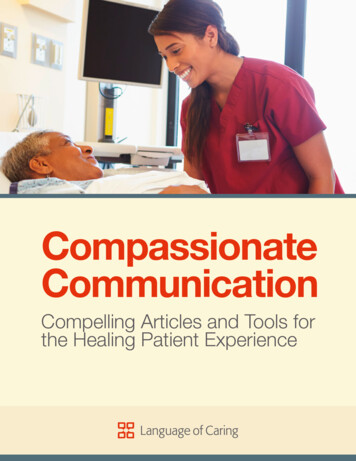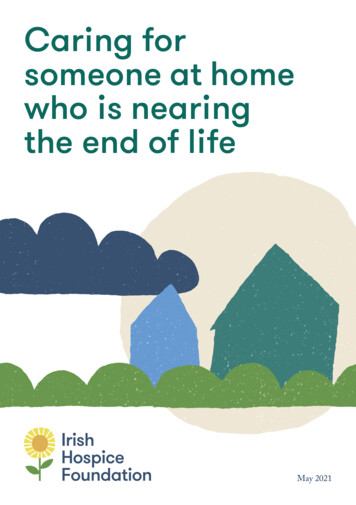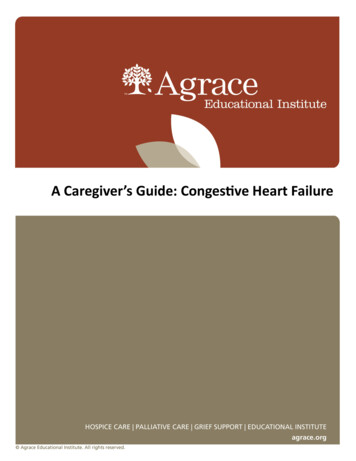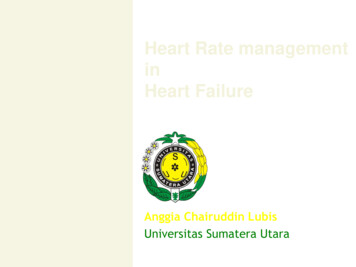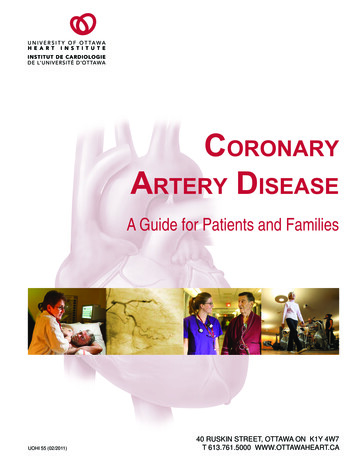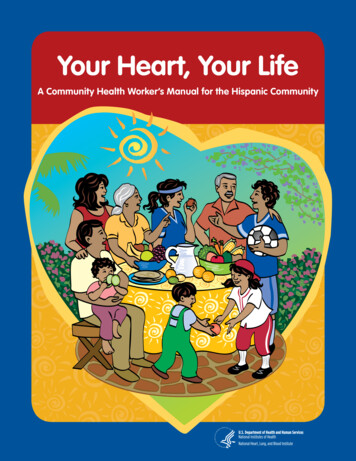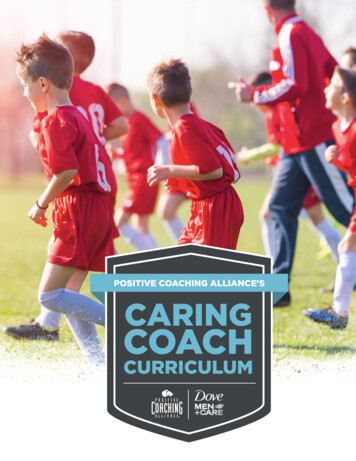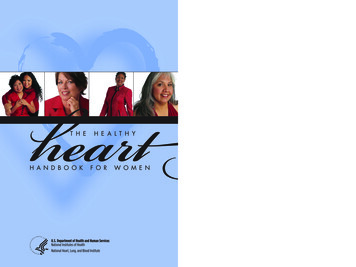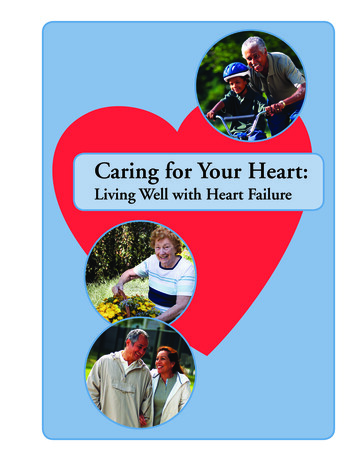
Transcription
Caring for Your Heart:Living Well with Heart Failure
What is Heart Failure? Heart failure means the heart cannot pump theblood well. When your heart doesn’t pump well, it can make youfeel weak, tired, or dizzy. Heart failure causes water to leak out of your bloodvessels. This water can fill up your lungs and make youshort of breath. It can also cause your legs to swell.Water in legs causes swelling.Water in lungs canmake you short of breath.1
Things You Can Doto Live Well with Heart FailureTake your medicines (every day) correctly.Eat less salt.Exercise regularly.Check yourself each day.2
How to Take Your MedicinesHeart failure can be controlled with medicine.Taking your medicine right will help your heartpump better and can make you feel better andlive longer.Take your pills Take each of yourmedicines, every day,at the right times Do not skip doses of your medicines, even when youfeel good. If you think you are having side effects from yourmedicines, don’t stop taking them, talk to your doctorimmediately. If you are having trouble paying for your medicine,talk to your doctor.3
How to Take Your MedicinesDon’t run out of pills Make sure you always have enough medicine left in yourpill bottles. Don’t let your medicine bottles run out.Corner Pharmacy# 551JONES, MARIA107 Overlake DriveChapel Hill, NC 27516Rx: 284474FUROSEMIDE: 20 mgQuantity: 30Refills: 0 Be aware of how many refills you have on your pillbottles. Every time you pick up your medicines, checkthe number of refills you have left. If the label saysNo Refills or Refills: 0 then call your doctor right awayto get more refills. Get all of your pills from the same pharmacyevery time.4
How to Take Your MedicinesHave a systemHave a system that helps you remember how andwhen to take your medicines. Keep a list of your medicines with instructions for howmany pills to take, and when to take them. Keep your medicine bottles in a place that makes it easyto remember to take them. Keeping your medicines nextto your toothbrush, at your bedside, or in the kitchenare good ideas. Some people use a pill box in which they put their pillsfor each day of the week. If you are going out of the house for a long time, bringenough medicine with you.5
How to Take Your MedicinesBring your pills when you go to the doctor Bring all of your pill bottles and medicine list to eachdoctor visit. Show your doctor how and when you take your pills.This will help you and your doctor keep you safe andmake sure you don’t run out of pills.6
How to Take Your MedicinesKnow your “water pill” (diuretic)Make sure you know which one of your pills isyour “water pill”— ask your doctor or pharmacist. Your water pill is also called a diuretic. The mostcommon kind is called Lasix which is the same asfurosemide. Your water pill (or diuretic) controls how much saltand water you have in your body. Taking more of thispill will make you “pee” (urinate) more to get rid ofsalt and water. You and your doctor might change how much of thismedicine you take from one day to the next to helpkeep your body in balance and keep you out of trouble.My water pill:7
You Can Do ItHere is a place to write down ideas to help youtake your medicines.Remember, taking your medicine right willhelp your heart pump better, and can makeyou feel better and live longer.8
How to Eat Less Salt Salt is also called “sodium” and is found in many foods. Most foods you eat have salt even if you can’t see it ortaste it. Salt acts like a sponge and makes the body hold water. Eating too much salt can cause your weight to go up,swelling in your legs, and water in your lungs.Eating less salt will help you feel better.You can eat less salt if you: Choose foods that are low in salt. Don’t add salt when you cook. Take the salt shaker off of the table.9
How to Eat Less SaltAvoid or limit these high salt foods:fast foodfrozen mealshot dogs, bacon,smoked meatpizzacheesecanned beansand vegetablesinstanthot cerealscanned orpotted meatsnack foodscanned andsmoked fishcanned soupadS a l sin gserDsauces andseasonings10
How to Eat Less SaltChoose these low salt foods:fruitfresh fishfresh meatsyogurtfrozenvegetableslemon slice, oliveoil, and vinegardried beansfresh vegetablesunsaltedmargarinewhole oatsgraham crackerseggs11
More Tips on How to Eat Less SaltWhen you eat out: Ask for food cooked with no salt. Avoid butter, cheese, or sauces. Avoid fried foods — choose grilled, baked, or steamedfoods. Choose oil and vinegar salad dressing. Limit or choose fast food items with less sodium. Avoid bacon, sausage, or ham.12
More Tips on How to Eat Less SaltWhen you eat at home: Don’t add salt to food when you cook or eat. Season foods with herbs and seasonings that do nothave salt. Make your own or choose low sodium sauces, saladdressings, breads, and desserts. Avoid “instant foods” that come in a bag or box. Rinse canned foods (even canned fish) before cookingand eating them.Read food labels and choose foods that haveless than 140mg of sodium per serving.13
How to Eat Less SaltReading a Food LabelStep 1:Look at theserving sizeStep 2:Look at thesodium per servingStep 3:choose foodswith less than 140mgsodium per serving This food has 30mg of sodium in ½ cup. This food is a good choice! Watch how much you eat.14
How to Eat Less SaltReading a food labelChoose items labeled:Sodium FreeWatch out foritems labeled: This food has 220mgof sodium in ½ cup. This food is nota good choice!15
You Can Do ItChoose or write down 1 or 2 things you willdo for the next few weeks. I will use a salt-free seasoning for cooking and at meals. I will rinse canned foods before cooking and eating them. When I eat out, I will ask for my meal with noadded salt. I will remove one high salt item from my diet this week. I will make low sodium sauces and salad dressings. I will avoid eating at fast food restaurants. I will choose fruit or fresh vegetables for snacks. I willRemember, small changes in your eating canmake a big difference in salt intake. You willfind that your taste adjusts over time and youget used to eating less salt.16
Exercising Well with Heart FailureWhat’s in it for you? Being more active is one of the best things you cando for your heart failure. Moving more can help you have more energy andfeel more upbeat.Start now!If you are not exercising, start with 10 minutesa day. It can be as simple as walking 5 minutesfrom your door and turning around andwalking back.Be Safe Start slowly. Stop if you feel chest pain, dizziness or have severeshortness of breath.17
Exercising Well with Heart FailureYou can exercise by: Using a stationary bicycle. Walking in your neighborhood or at the mall. Going to an exercise class. Sweeping, vacuuming, or dusting. Mowing the lawn or working in your garden. Walking to the bus.A lot of people say that walking is the easiestexercise for them. Many people walk with afriend or their pet. Walking is easy, fun and free.So turn off the TV, get up and get moving!18
Exercise Will Get EasierYour body needs time to get used to beingmore active.You will notice that it will get easier and you willbe able to do more.Steps for doing more: Begin by doing an activity for 10 minutes, three timesper week. After a couple of weeks, add 5 minutes, so that you areexercising 15 minutes at a time. When you feel comfortable doing more, add another5 minutes. You want to work up to 30 minutes of exercise 3 timesa week.19
Exercise Will Get Easier“I enjoy walkingafter dinnerwith my husband.”“I found an exercise classat the Senior centerthat works well for me.” Exercise with a friend or partner if possible. Wear clothes and shoes that fit well. Start slowly. Ease your way into exercise.20
You Can Do ItPick things YOU like to do. Try one of thesesuggestions or write down 1 or 2 things youenjoy that make your body move. I will take a short walk every day. I will take a walk for 10 minutes 3 days a week. I will dance for 10 minutes at home 3 days a week. I will ride a stationary bike for 10 minutes 3 days aweek. I will stretch for 10 minutes when I wake up 3 days aweek. I will do a water exercise for 10 minutes 3 days a week. I will21
Daily Check-UpHeart failure can cause you to havesymptoms or feel bad. If you can catchthese symptoms early, you can take actionto feel better and stay out of the hospital.Each day, do a check-up. How do you feel? Do you have swelling? Weigh yourself.We will explain how to do the dailycheck-up in the next pages.22
#1— How do I feel today?You can tell how well your heart is doing byhow you feel and what you can do.Am I short of breath walking?Heart failure can make you feel short of breathwhile walking.Doing well — walkeasily with noshortness of breathGetting worse —shortness of breath afterwalking a short distanceCall your doctor —shortness of breathat rest23
#1— How do I feel today?Am I short of breath sleeping?Heart failure can also make you feel short ofbreath when you are lying down. When it getsreally bad, some people find they need to sleepsitting up.Doing well —sleeping flat, noshortness of breathGetting worse —needing 2 pillowsor more to avoidshortness of breathCall your doctor —have to sleep uprightto avoid shortnessof breath24
#1— How do I feel today?Am I feeling faint or dizzy?Sometimes people with heart failure feel verydizzy or lightheaded.Doing well — Notdizzy or sometimesa little dizzy whenstanding upDoing worse —Dizzy for a long timeCall your doctor —Almost passed out,passed out (fainted),or fallen25
#2 — Do You Have Swelling?Swelling in your legs can be a sign that yourbody is holding onto too much water.This is easy to check.To check for swelling each morning: Press firmly into the skin on the front part of yourlower leg. If your finger makes a pit in your skin, you haveswelling in that part of your leg. Be aware of how much swelling is usual for you andlook for changes.Doing well —no swellingGetting worse —swelling in ankle or shinCall your doctor —swelling in knee area26
#3 — Weigh Yourself Each DayWeigh yourself each morning: After you “pee” (urinate). Before you eat breakfast. Before you get dressed.Know your target weight Ask your doctor what your target weight is each timeyou visit. The target weight is where your heart isworking best. You and your doctor need a plan for when your weightgoes up too much.27
Putting It All TogetherThe daily check-up helps you know how totake action for your heart failure. By findingproblems early, you can feel better and stayout of the hospital. Check how you feel. Check your swelling in your legs. Check your weight. Decide if you need to call your doctor orheart failure team.If you’re doing well, keep up the good work!Take your medicines, watch your salt, andget your exercise today.28
When Should I Call?Call us if:PhoneYou are short of breath at rest or moreshort of breath than usual.You have to sleep upright or in a chair.You have more swelling in your legs than usual.You have a lot of dizziness or light-headedness thatis worse than usual.Your weight goes up by 4 or more pounds fromyour target weight.29
You Can Do ItHere is a place to write down ideas or questionsyou have about your daily check-up.Remember, your daily check-up helps youknow how your heart failure is doing.30
Developed by:Cecil G. Sheps Center for Health Services ResearchDivision of General Internal MedicineUniversity of North Carolina at Chapel HillFeinberg School of MedicineNorthwestern UniversityUniversity of California San FranciscoCenter for Vulnerable PopulationsSan Francisco General HospitalForquestions regarding this educational material, please cy@schsr.unc.edu.NIHGrant #: 1regardingR01 HL081257,National material,Heart Lungand BloodFor questionsthis educationalpleaseemail Institute. Copyright 2014.
pump better and can make you feel better and live longer. Take your pills Take each of your medicines, every day, at the right times Do not skip doses of your medicines, even when you feel good. If you think you are having side effects from your medicines,
